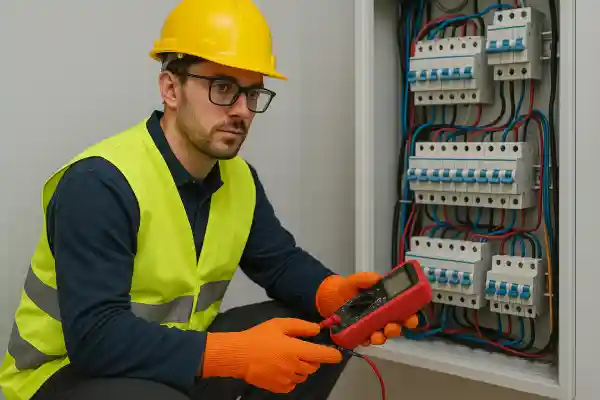
For businesses operating in today’s fast-evolving commercial landscape—particularly in the construction, property, and facilities sectors—electrical upskilling is no longer a ‘nice to have’. It’s a commercial imperative.
In 2025, we’re facing an unprecedented convergence of regulatory tightening, rising energy costs, net-zero targets, and a severe shortage of qualified electrical professionals. These pressures impact not just your compliance risk, but your ability to bid competitively, deliver projects, and retain skilled workers.
For employers across Hertfordshire and Greater London—including Cheshunt, Broxbourne, and Waltham Cross—upskilling your electricians and site operatives in areas like the 18th Edition Wiring Regulations, PAT Testing, 2391 Inspection & Testing, and renewable technologies is the smart route to resilience and growth.
Electrical safety legislation in the UK is governed by frameworks such as:
Failing to train staff in these areas can result in:
Take PAT Testing, for instance. While not legally mandated at specific intervals, UK law does require employers to maintain all electrical equipment in a safe condition. According to the Health and Safety Executive (HSE), testing must be performed by a “competent person”—which means training is essential to stay legally compliant. Source: HSE
The UK currently has around 170,000 qualified electricians, but needs at least 12,000 new electricians per year to meet demand—and this shortfall is increasing due to retirements and renewable infrastructure targets.
In Broxbourne and the surrounding Hertfordshire region:
The result? A hyper-competitive market for electrical talent. Offering career progression through recognised training (like the 2391-52 qualification) helps you retain staff and avoid delays caused by labour shortages.
The gold standard for electrical installation safety in the UK. All electricians working on commercial systems must stay current with the latest amendments. Training ensures:
👉 Available as fast-track refresher for experienced staff or full course for apprentices and improvers.
A must-have for electricians who need to issue Electrical Installation Condition Reports (EICRs) or perform periodic inspections.
Learn more at Learn Trade Skills
Competent PAT testers are essential for equipment-heavy sectors like:
🔎 The HSE confirms that PAT testing must be done by a trained person with the ability to interpret results—training is not optional.
Source: HSE PAT FAQ
Installation and maintenance of commercial fire systems now require evidence of BS 5839 competency.
Learn more about BS 5839 Fire Alarm Courses
The net-zero push means that demand for low-carbon electrical services will skyrocket. Employers who invest in training their teams now will be able to capitalise on public funding, new tenders, and retrofit projects.
⚡ Only certified installers are eligible to deliver funded solar projects under MCS or equivalent schemes.
Source: MCS Installations
No two employers are the same. That’s why more businesses are requesting bespoke corporate training. This could include:
Our consultancy division has helped contractors, landlords, and housing associations tailor courses for everything from emergency lighting compliance to EV charging project mobilisation.
In Broxbourne alone, over 500 new apprenticeships were started in a single year—yet there’s still a shortfall in electrical trade uptake. Apprenticeships remain:
Local institutions like Hertford Regional College and initiatives like HOP (Hertfordshire Opportunities Portal) can connect employers with motivated apprentices ready to train.
🎯 Smart employers use apprenticeships to retain experienced workers and bring them into more skilled roles—e.g. maintenance technicians becoming qualified electricians.
Source: Broxbourne Skills Analysis
A: For general electrical work, at least an NVQ Level 3 with current 18th Edition is essential. For testing, the 2391-52 is required.
A: Not by frequency—but equipment must be maintained in a safe state, and testing must be done by a competent person. That means training is a legal necessity.
A: Absolutely. Many firms upskill facilities or maintenance teams using adult apprenticeships or short qualifications like 18th Edition or PAT.
A: Yes. Learn Trade Skills and our delivery partners like Wire Now can deliver tailored, on-site training across London, Herts, and beyond.
A: If you’re a levy-paying employer, use your Apprenticeship Levy. SMEs may access up to 95% government funding for apprenticeships and some qualifications.
Businesses that act now to upskill their electricians and technicians won’t just stay compliant—they’ll:
In a sector where skills shortages threaten to delay national net-zero targets, those who invest in training will stand tall as capable, compliant, and competitive operators.
🔗 External Resources
If you’re ready to upskill your electrical team or explore corporate training options in 2025, visit Electrical Training for Businesses or contact our team to discuss tailored solutions for your business.
Tolga Aramaz is the Director of Learn Trade Skills (LTS), a family-run training centre specialising in electrical installations. With years of experience and a deep understanding of the electrical industry, Tolga is known for their exceptional organisational skills, attention to detail, and commitment to delivering outstanding results. They provide valuable insights and guidance to electricians, contractors, and businesses, ensuring compliance with industry regulations and safety protocols. Through engaging training programmes and consultancy services, Tolga empowers professionals to excel in their roles, fostering long-term relationships built on professionalism and customer satisfaction.
“Lorem ipsum dolor sit amet, consectetur adipiscing elit. Ut pretium tristique purus nec consectetur. Nulla feugiat eget tellus aliquam scelerisque. Sed eget luctus enim, sed mattis enim. Lorem ipsum dolor sit amet, consectetur adipiscing elit. Ut pretium tristique purus nec consectetur. Nulla feugiat eget tellus aliquam scelerisque. Sed eget luctus enim, sed mattis enim.Nulla feugiat eget tellus aliquam scelerisque. Sed eget luctus enim, sed mattis enim. Lorem ipsum dolor sit amet, consectetur adipiscing elit. Ut pretium tristique purus nec consectetur. Nulla feugiat eget tellus aliquam scelerisque. Sed eget luctus enim, sed mattis enim.”
William Goss
Electrician course
11/11/2024